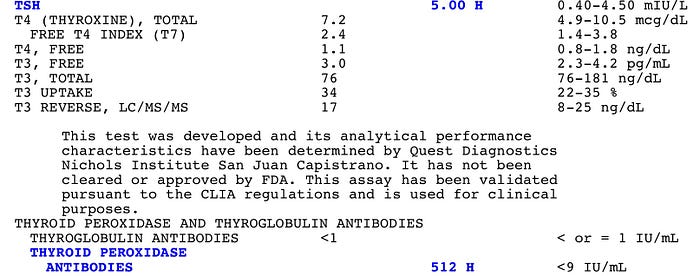Thyroid Blood Labs: Here’s What You Need to Know.
Helping you prepare the next time you visit your doctor about your thyroid.

You’ve gained a few pounds, have been feeling pretty anxious, and feel exhausted all the time. You hit up the internet, and come to the conclusion of: “Oh, something is wrong with my Thyroid!” Hopefully that internet source tells you to ask your doctor for more information and about potentially running some bloodwork for your thyroid. You meet with your doctor, tell them your symptoms, and they say: “Ah, it’s your thyroid! Let’s run some tests.” Hallelujah! You visit your doctor when the results come in, and they say: “Your TSH came back normal, so your thyroid is fine.” Well darn. Now you feel pretty defeated.
But wait, what if your thyroid isn’t ‘fine?’ What if your doctor is missing something? What if they should have run more than just TSH? That begs the question, what is TSH, and, if they should have run more markers, what other markers are there? What’s making me struggle to lose weight and feel so anxious and tired?
Thyroid Lesson
The thyroid is a butterfly shaped gland located at the lower portion of your neck, and is responsible for producing thyroid hormones (T3 and T4). These hormones play a pivotal role in your metabolism and cognitive function.
TSH (Thyroid Stimulating Hormone) is itself a hormone, produced within a region of your brain called the Pituitary Gland. It is responsible for telling your thyroid gland to make T3 and T4 (hence the word ‘stimulating’ in the name). Once enough thyroid hormones are produced and available for use within the blood, the Pituitary Gland senses these rising levels, and TSH will start to come back down. This is what’s referred to in physiology as a negative feedback loop, i.e., where the presence of one hormone (T3/T4) causes another hormone’s levels to go down (TSH). Vice versa for low levels of T3/T4 causing greater production of TSH. Think of TSH as ‘whipping’ the thyroid gland to make hormones when there is not enough T3/T4 available.
What’s interesting is that the thyroid produces anywhere from 85–90% T4, and 10–15% T3, yet T3 is the active hormone (the hormone our cells use). T3 and T4 can also be measured on bloodwork. The thyroid also has many enzymes that assist with hormone production, one of which is Thyroid Peroxidase (TPO). If you’ve had blood work done before you may recognize this enzyme, as TPO antibody levels can be used to assess thyroid autoimmunity (more on this to come).
The Lowdown on TSH
Maybe 20 million Americans suffer from some sort of thyroid disorder. Nearly 5% have Hypothyroidism (not enough thyroid hormone), and 1.3% have Hyperthyroidism (too much thyroid hormone) (1). In the world, the most common cause of Hypothyroidism is iodine deficiency, but, in the United States, the most common cause is due to autoimmunity to the thyroid gland, Hashimoto’s. The best way (most sensitive) to test for thyroid autoimmunity is to test those TPO antibodies we talked about before (1).
However, the first test doctors go to for detection of any thyroid problems is TSH. This is because TSH changes more rapidly than Free T3 and Free T4. For example, a 2-fold increase in free T4 will result in an 100-fold change in TSH (2). While small changes in TSH bring about very small changes in T3 and T4. It’s also partly a cost issue. Anecdotally, I’ve had several patients who’ve been told by their primary care physician, “Your insurance will only cover me running TSH.” Can’t say I blame patients for only having labs done that are insurance-covered.

As you can see my TSH came back above the reference range. Based on this value, I’d be placed in the camp of Subclinical Hypothyroidism (slightly elevated TSH but normal free T4; Overt Hypothyroidism means my free T4 would be low as well). However, TSH should be tested multiple times before making any conclusions due to its 40–50% variation within individuals (2).
Free T4
Levothyroxine-hypothyroid medication is currently the #1 prescription drug in America (in terms of total prescriptions). It is a synthetic version of our bodies’ own T4. Free T4 is typically ordered when someone is on Levo-, as providers use it to determine whether or not to adjust the dosage.
A recent review of lab testing for thyroid dysfunction had this to say about only testing TSH: “…it’s sole utilization is insufficient in subclinical thyroid disease, and FT4 should be tested as well” (3). FT4 meaning Free T4 (T4 circulates in the body as either bound to different carrier proteins or unbound, ‘free’). AKA if your health care provider suspects thyroid dysfunction, free T4 should be included. Remember, T4 is not the active hormone, T3 is. T4 is more often tested because that’s the primary form produced by the thyroid gland.
What about those Antibodies?
If you notice from my bloodwork, my antibodies came back high. Anywhere from 5–20% of the population has TPO antibodies present (3). If you think of your four closest friends plus yourself, odds are that at least one of you has thyroid autoimmunity. However, this does not mean you will develop thyroid symptoms. Before I had bloodwork done, I didn’t have any of the typical thyroid symptoms, yet based on my TSH and antibodies, you’d think I’d been struggling for years. That’s why a good clinician should take both your symptoms and your lab work into consideration when evaluating you.
What are the odds of me developing Hypothyroidism if I have antibodies? In a study of over 5700 people, those who tested positive for TPO antibodies were also tested for their levels of TSH and thyroid hormones. The researchers found that 62.3% were considered euthyroid, meaning a normal functioning thyroid and no hormonal abnormalities (4).
This means having antibodies doesn’t mean your thyroid will stop functioning, right now. What about in the future? Those same researchers found that after a 3 year follow-up, of those that had antibodies, but normal thyroid function, 65% remained euthyroid. Then after a 6 year follow-up, of those who had antibodies with normal thyroid function, 72.2% remained having normal thyroid function. This means having thyroid antibodies is not a ‘death sentence’ for your thyroid gland. Rather, having antibodies is a risk factor for developing hypothyroidism (1).
If you’re currently struggling with any symptoms of weight gain, fatigue, hair loss, or anxiety, make sure to speak with your primary care physician about your options. If you’re wanting to have blood tests done for your thyroid, I recommend you seek out a Functional Medicine Practitioner who has experience working with thyroid conditions, including Hashimoto’s. Otherwise, trying to interpret your own blood work can be both confusing and time consuming.
If you have any questions, comments, or concerns on anything we discussed, feel free to email me at nicholas.belden16@gmail.co. You can also reach out to me on Twitter, or Instagram, or you could always pose a question in the comment section of this article.
As always, Trust in Your Gut.
Disclaimer: The contents of this article are for educational purposes only, and are not intended to diagnose or treat any condition. Do not apply any of the information in this article without first speaking with your doctor.
Text-References
- Siriwardhane T, Krishna K, Ranganathan V, et al. Significance of Anti-TPO as an Early Predictive Marker in Thyroid Disease. Autoimmune Dis. 2019;2019:1684074. Published 2019 Jul 28. doi:10.1155/2019/1684074
- Sheehan MT. Biochemical Testing of the Thyroid: TSH is the Best and, Oftentimes, Only Test Needed — A Review for Primary Care. Clin Med Res. 2016;14(2):83–92. doi:10.3121/cmr.2016.1309
- Soh SB, Aw TC. Laboratory Testing in Thyroid Conditions — Pitfalls and Clinical Utility. Ann Lab Med. 2019;39(1):3–14. doi:10.3343/alm.2019.39.1.3
- Amouzegar A, Gharibzadeh S, Kazemian E, Mehran L, Tohidi M, Azizi F. The Prevalence, Incidence and Natural Course of Positive Antithyroperoxidase Antibodies in a Population-Based Study: Tehran Thyroid Study. PLoS One. 2017;12(1):e0169283. Published 2017 Jan 4. doi:10.1371/journal.pone.0169283
